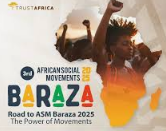Cold, Cold Opening
I have told this silly story elsewhere, and I’ll have to shamelessly repeat it here today. On a chatty walk to lectures one afternoon, this classmate of mine, out of the blue, holds his breath for a few seconds, then resumes the conversation as though nothing had happened, after a certain moment had passed. His reason for this awkward pause was a nonchalant, matter-of-fact one, “Oh! White people…they stink. Wait, did you not know that?” Those group of White students walking past, being foreigners in this land, heading perhaps to get themselves some education too, merited in someone a self-imposed ceasing of air.
Such power! To arbitrarily finger-point to a people and ascribe to them, an attribute. To make one and whole, a group of people comprising thousands and millions of individuals… to make one, and ascribe them and their generations unborn, such-and-such degrading attributes at will…such power!
“That’s Just The Way It Is”
You know over here we talk about everything. A few weeks back, in the ‘Never Say Coup’ series of articles we said something along the lines of, ‘When a people are made to believe that certain negatives are peculiar to them, such a people begin to truly believe that such things are in fact in their nature.
And when this happens—when this notion of peculiarities is borne and ingrained in such a people, what ensues is perpetuity. And something that is supposed to be a mere hitch in their national journey, becomes to the people an essence of self and of nationality.’ That’s a dangerous thing, isn’t it? Forget what they say about curses—there are scarcely any spiritualities to them; they are scarcely conjured by demonic incantations. This right here is the very definition of a curse.
An entire country, continent, and race easily become victims of generational curses as soon as they resort to fatalism—accept as true those purported peculiarities attributed them. And ‘fatalism’ these people almost always have no option but to resort to, because these assertions, they are done ever so forcefully by their imposers.
You know over here we talk about everything. That’s why weeks back when exploring the world’s Black/White dynamic, we said something along the lines of: “It’s shameful, really. It’s shameful because…the White folk, they have mastered the art of rebranding—rebranding that borders on the psychopathic. Rebranding that suffers amnesia—intense selective amnesia.
Rebranding that completely wipes out the past, wipes out its hands and mouth; ‘blood is a stubborn stain, try white vinegar; wash and dry clean, forget the blood ever happened’ kind of rebranding. “Out, damned spot! Out, I say,” says the White folk to their immediate past, except in their case, the damned spot, unlike Lady Macbeth’s, is obedient and outs. The damned spot, in the case of the White folk, is obedient because the White folk, they possess the ultimate ink, pencil, and eraser. They write and wipe history as they please…
This Caucasian rebranding is a singular act of ‘human laundering’, ‘memory laundering’ that humans worldwide can perhaps take a good page from. Destinies can be changed, one’s story can change for the better. A demon today is just an angel away. The White folk, I tell you, have mastered the art of rebranding. This has been admittedly easier for them to do because as noted, the world’s giant pen, pencil, eraser, all are in their hands. They write and wipe history as they please.”
Of course, we capped off that article, praying upon our own selves—us all Black people spread worldwide—a dose, just a dose of this selective amnesia. We were quick to caution God, however, to be cautious with this dosage—that it is not made “too high that it borders on hypocrisy, like some of our White folks tend to suffer.”
We are in urgent need of this amnesia because the Black folk interspersed worldwide still suffer, in varying degrees, PTSD, a lowered sense of self—a sense of self tainted with uninformed stereotypes imposed upon us, most especially our kinsfolk in the Diaspora. Certain bad traits found worldwide among people of all races are strategically imposed on us, as sole proprietors—sole perpetrators.
Intentional upliftment of the Black folk is imperative. We have great damages to undo, generational curses to break—curses strategically caused us, not spiritually or biologically so done. Now, you know damn well that God is no stupid god—there is no such spiritual curse enchanted, only those strategically caused us by fellow humans. We are agreed on this point—I hope.
A Review
Intentional upliftment of the Black folk is imperative. A race-wide therapy is very much needed. There is an urgency in this matter—an urgency that requires all persons blessed with a voice, be it expressed in ink, through music, art, in the law courts, in whatever profession… each person, being blessed with a voice, must see the urgency in this matter; and in their very own small corners of talents, must make it a point to partake in this conscious upliftment—this conscious undoing of the intentional damages done us. And that’s why a person cannot help but love poets like Kendrick Lamar, a.k.a. ‘K-Dot’, a.k.a. ‘Oklama’, a.k.a. Duckworth (who knows his worth).
Let’s get this right off the bat, this article is not so much an album review as it is an artiste review. Well, if we be frank, this is not so much an artiste review as it is a culture review. Upon second thought…this, in fact, is not so much a culture review as it is a world review—a world having at its core a Black-White dynamic.
Those of us in the motherland, let us transport ourselves for a brief period into the shoes of our kinsfolk in the Diaspora. Having suffered a history of degradation, right from the demonic era of slavery, to the unyielding racism that ensued thereafter (and still is ensuing, in fact), our kinsfolk have had to, with each step of the way, in all aspects of their life, fight for everything—literally and figuratively.
From their very right to life, to their right to shelter, education, right to decent employment, all freedoms ascribed freely to any people of a land, our Black kinsfolk have had to fight for. Being historically denied education and decent employment, these transported Africans, enormously talented, yet immensely suppressed, have historically found, with their resilient spirits, means of expressions in channels such as art and music.
Music was not just a thing to dance to; it was a thing to think to—to liberate oneself to. And Kendrick Lamar, he has proven himself an ardent believer and student of this fact. Since his introduction to the world in the early 2000s, the young man has unapologetically championed Black liberation and transformation—even when these topics were not precisely popular.
Cognisant of how vital a mass of people are to a prophet, Kendrick certainly was fully aware of the fact that he needed that wide and varied audience that made for a superstar. In this very shallow world of pop-stardom and Hollywood-stardom, Kendrick was challenged, on the one hand with fame, and on the other, purpose. Needless to say, he chose the latter, but got, too, the former still.
Triple Consciousness
He has provided the world autobiographical works, works which have mirrored the very world around him—a world symptomatic of the bad card dealt the Black folk. In shedding light on his personal experiences as a Black man in the so-called White America, he has concurrently shed light on the skewed world dynamic. In his first studio album ‘Good Kid M.A.A.D City’, we traverse a journey through his tumultuous formative years as a good kid, in a ‘mad’ city, if you will.
In ‘Section 80’, Lamar gives us a 360-degree pensive view of his very tortured generation. In ‘To Pimp A Butterfly’ we delve even further deeper into the Black reality—the African American struggle. These realities are without doubt, grim, so we see in this piece of work, a very conscious effort by Kendrick, at reassurance—famously in a track like ‘Alright’.
With the introduction of each and every one of these classic body of works, Kendrick was being lifted (exponentially) to the throne of ‘prophet’—a saviour of a sort; attributes very much well-deserved, yet in the end damaging to a mere mortal’s psyche. It makes it so hard to be humble, you know—and to stay glued to one’s assignment, if they revel in these praises.
In ‘Damn’ we find Kendrick slowly attempting to shed this crown. In this work, we sense his dilemma and self-assessment—is he to bear this crown of ‘prophet’ whole without scruples? Or is he to let these accolades go unclaimed, causing the world around him yet another loss of a Black hero, as scarce as they are made to be? In his recent work ‘Mr. Morale & The Big Steppers’, we find Kendrick undertaking this self-assessment even more poignantly—even if it means reinforcing those stereotypes imposed on the Black folk by the inferiority-complex-ridden vultures—the (remaining few, ahem!) racist White man and woman.
Don’t get this wrong—it can never be said that this perception of sainthood was carefully and intentionally crafted by Kendrick with his own hands, with each work he has put out over the years. Au contraire. In fact, each of these body of works have hinted, quite explicitly, at his fallibility. Yet the overarching message of upliftment for his fellow Black men and women being very vital, the world has conveniently glossed over these hints of imperfections. Sensing this glossing over, Kendrick in his most recent work rehashes these imperfections even more poignantly.
In this era of a supposedly introspective America—an America asserting this introspection with, what can only be described as brutality, and perversion even… in this ‘cancel culture’ era this nation finds itself in, we find Kendrick Lamar therapeutically washing his own dirty linen before this very world—this Grim Reaper of a world. This, upon first glance, sounds like suicide, yet it’s not. This linen washing is a very necessary move on many fronts:
- Firstly, because the vultures will eventually go in search of, and will ultimately find what it is they are specifically looking for, his flaws—flaws fraudulently ascribed by White America to Black America;
- Secondly, what better way for a person to burn all it is that they hate in themselves than to do so in confession—in an overt soul-cleansing?
- Thirdly, what better way to do away with any sense of Imposter Syndrome a person may be suffering than to come to the world, undoing the perception of sainthood, sageness, perfection, etc. imposed on them?
So then, this album, ‘Mr. Morale & The Big Steppers.’
The Soul, The Heart
In the track ‘Mother I Sober’ (my favourite, as you will soon find), Kendrick goes through a very excruciating process of baring his soul. Having suffered a two-year writer’s block, he comes back to the world, a man, a human being, not a prophet, not a saint—a man being much like the rest of the world, with a track record of life tainted.
There are no excuses for these misdoings, only apologies to persons to whom they have caused harm—his fiancée to boot, and consequently to his children if, as he’s fully aware, rectification is not followed through with. Oklama, he suffered a two-year writer’s block arguably because he had been looking for poetry elsewhere—elsewhere in the world; anywhere but within his own self. But what does God do? She redirects him to navigate his own soul. Because—remind me again—what is it that they say about the man in the mirror?
Kendrick has spent his entire career carrying a strong message, yet he’s shared this message to the world without being preachy. Yet in the song ‘Mother I Sober’ he’s almost preaching to himself. To effectively proceed with his assignment to the world, Kendrick had to do some work on his own self. So, in the track ‘Mirror’, he announces quite bluntly, “I choose me, I’m sorry.” The world is expecting of him yet another brilliant societal critique, but Kendrick, what does he do? Self-flagellation—for the most part.
In this track, Kendrick peels away a very thick layer, and we see very jarringly, sticking out like a sore thumb, abuse—sexual abuse suffered by him in the hands of a cousin. ‘Frozen moments’ still haunting him. And then there is the physical abuse suffered his mother by family members. The five-year-old Kendrick had to helplessly watch on as his mother was beaten ‘black and blue’. Childhood memories are frozen in time and come back to haunt one in adulthood. He’s haunted by an “image of [his] queen that [he] can’t erase.”
Till this day, he can’t look his mother in the eyes without this past pain taking over. He confides in us. We witness in this track too, emotional abuse (if you will), this time around suffered his fiancée, Whitney by him—with his infidelity. And just like that we have on our hands another tale of: ‘the abused becomes the abuser’. This expression Kendrick himself uses in the introductory single, ‘The Heart Part 5’.
This is an excruciatingly painful process—soul baring at this level. But Oklama, he finally did it! Oklama, he has finally set himself free of this burden—the burden of both the abused and abuser. Kendrick Lamar, he did it! But K-Dot, he cheated. Because you see, this level of soul baring really is soul-crushing. To liberate, it first crushes.
So Kendrick, he buried this truth in a hodgepodge of world issues, all interconnected, yet effective at this concealing—in a whopping eighteen-track album, skilfully hopping from matters of spirituality and faith to toxic masculinity, to broader topics on mental health all the way to the feigned righteousness characteristic of his nation’s cancel culture—hoping that in so doing this track would be hidden. He employs the assistance of none other than the immensely private and mysterious artiste, Beth Gibbons. But that’s beside the point.
World issues can wait, Kendrick must see to his own healing. But Kendrick, he’s not selfish after all. This is not a selfish album. To assert this would be to claim that these flaws highlighted in this works are peculiar to this one individual called Kendrick Lamar. I am sorry, but Black folks of America cannot even claim this album to be theirs only. Because to say so would be asserting that these issues highlighted in this work are peculiar to this one group of people called African Americans.
These issues are not peculiar to this one man, neither are they to this one ethnicity, nor to this one race called Black people. These issues have their tentacle spread far and wide. And this assertion right here brings us back to the matter of culture—the matter of peculiarity and perpetuity.
Peculiarity, Perpetuity, Culture
Here’s the thing about finger-pointing, we can all do it. Here’s a thing about stereotyping, we can all fabricate them as we please, and impose them on whomever we please. Mostly the success of this finger-pointing endeavour is largely dependent on the power we yield—be it territorially, economically, intellectually, or in numbers. When we form the majority, we can afford to point to all other groups around us, and assign them peculiarities. And the thing about stereotypes is, they are always right.
Because all an imposer needs to do is to go in search of one, just one, example to prove to themselves true, those attributes. The thing about stereotypes is, as soon as we decide on them, we go in search of examples of them—specifically in those people we have assigned those degrading attributes. We ignore all other groups who share those traits; we disregard our very own selves who share these attributes.
So yes, White people smell. In one part of the world, in a country like USA, the White folk, blessed with the power of numbers, is finger-pointing, assigning the Black folk, Asian, Caribbean, etc. stereotypes as they please. But over here in Ghana, these imposers are—according to this former mate of mine, and apparently I was the only one unaware—people who smell so bad, that when they pass, breaths have to be held. Here’s the thing about stereotyping, we can all do them—so far as one is blessed with the power of, among others, territory, numbers, controlling the narrative, etc.
Adam: On The Power Of Naming
That is why you have the White terrorists (very often, teenagers and young adults), casually taking arms every now and then, and for no reason at all, spraying bullets on their fellow human beings—in schools, churches, movie theatres, music concerts, etc., yet the White folk blessed with the advantage of numbers and the power of controlling the narrative in a country like USA, in so naming such perpetrators, desists from this very apt connotation ‘terrorist’. Yet in conversations regarding savagery, they are ever so quick to cite the Black folk as chief custodian of the term.
That’s why you have the White man committing acts of infidelities against their spouses…that’s why you have some historic White Presidents lifted to the thrones of ‘gods’, yet being in actuality un-convicted rapists, married men who forcefully slept with Black women, other women; being serial womanisers, yet someway, somehow, the White folk, on this land called the USA, being blessed with the advantage of, among others, the majority, insists that it is the Black man, the African American (historically disincentivised from marriage, as they have been) who are the naturally sexual promiscuous ones—the adulterers, the fornicators.
That is why you had the White folk, being blessed with the power of controlling the global narrative, over here in Africa, demonising the polygamous Black person, even as they went on, back at home, with their own endemic adulteries. (This sentence right here is a funny one, because the writer actually is not a fun of either.).
That is why you have the entire nation of America (comprising a majority White populace), being, with their religion as reason, for the longest time homophobic, yet somehow, in this ‘pride’ era of theirs, it is the Black man and woman—Black music, rap music, which now bears the tag of ‘homophobia.’
I tell you, the White folk, they write and wipe history (and the present) as they please!
You can only imagine the dilemma poets like Kendrick are faced with, while undertaking their God-ordained task of assisting the transformation and upliftment of the broken Black spirit. In shedding light on their personal stories, their race’s stories, hoping to, among others, find in this confession, remedy and relief, are they not, in so doing, reinforcing these stereotypes? In addressing and attempting remedies for these sexual abuses, infidelities, egregious murders, homophobia, violence, physical abuses, etc. he grew up accustomed to, is Kendrick, in so doing, reinforcing these stereotypes? As he explores these topics from a personal perspective, is he causing in his people, perpetuity? Is he, in so doing, assisting the White folk in concretising these grim realities as Black culture?
Even within those immensely thick four walls of his world, a world called the United States of America, one senses in Kendrick, liberation—if not yet totally achieved, liberation brewing. Like the metaphoric frog in the well, Kendrick senses the rest of the world—a well going far and beyond the realities imposed by his confines. So the words ‘Black culture’, made by the White folk to comprise, among others, infidelity in marriage, gangsterism, abusive relationships, etc. are nothing but mere social constructs. They are attributes finding origins in this same age-old fraudulent act called finger-pointing. They do not go to the root of his essence—his Blackness.
Transformation: Breaking Free From The Peculiarities
We will continue this topic next week, but let me quickly caution: don’t go smelling White folks. I’m serious. Because if you do, you will find exactly what you’re looking for. But when you indeed find that which you went in search of, just remember that for every three pungent White people you find, there are three equally smelly Black people, Asians, Indians, Caribbeans, etc. in the world. You think I’m lying? Don’t let me start mentioning names.
And also, wisdom, being not limited to just one group of people, I do believe strongly that very soon, the White folk will come to realise this same universal truth of ‘for every three you find…” we have just discussed. And they will come to shed off their fraudulent sense of self-importance, and the calculated belittling of ‘others’ they tend to do. To do anything outside this will be to concurrently open themselves up to some reciprocal, choice stereotypes some of us in our parts of the world can very so freely and readily conjure for them. Because the thing about stereotypes is, we can all come up with them.
Also, someone tell Kendrick that in so aptly humanising himself, he need not remove the saintly veil so wholly that he becomes to the equally sinful listener, a much-needed destruction, an entity to point accusatory fingers at—nothing but mere statistic of his race. In self-critiquing, he need not self-flagellate. Because you see, God is working on this prayers of selective amnesia of ours.
Not only will our past transgressions be forgiven, but we will, like the White folk blessed with this amnesia, forget them so completely that we will also, without scruples, lift ourselves to positions of perfection—as the Caucasian has successfully done. Now, you know damn well that God answers prayers!
Someone, please tell Kendrick that some of us are rooting for him ever so dearly. And we do pray that his works serve the same end in him as they have done many others—transformation, liberation.









